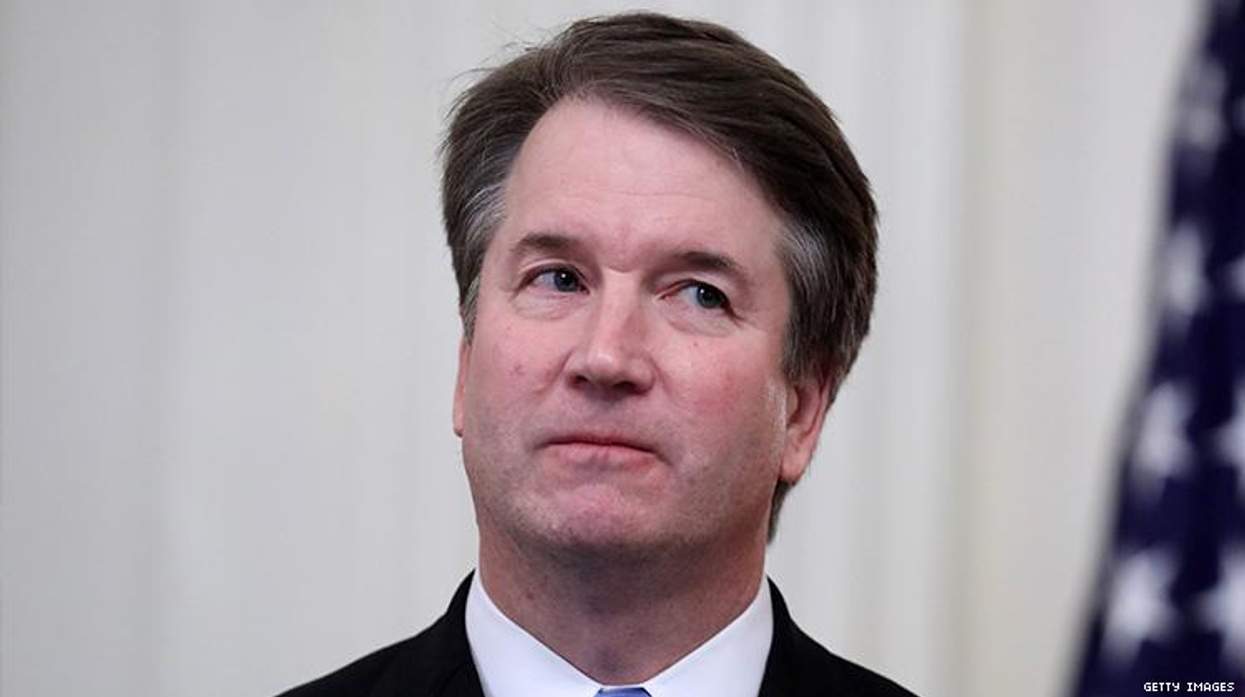The gravity of President Trump's nomination of a second Supreme Court justice for LGBTQ people and other vulnerable groups cannot be overstated. If confirmed, Trump's Supreme Court nominee, Judge Brett Kavanaugh, would tilt an already conservative court to the far hard-right. Political scientist Lee Epstein recently evaluated Judge Kavanaugh's record and found that it would place him well to the right of every single current justice except Clarence Thomas.
For LGBTQ people, in particular, this poses a serious threat. While we do not expect a direct reversal of the landmark holdings in Romer v. Evans, Lawrence v. Texas, or Obergefell v. Hodges -- historic Supreme Court cases that acknowledged the equality of LGBT persons, decriminalized same-sex intimacy, and recognized that same-sex couples have a fundamental right to marry -- there are a number of new issues that may be heard by the court and that could result in lasting harm to LGBT people and their families. That includes, for example, the constitutionality of discriminatory new state laws in which states allow agencies to avoid placing and providing services to children and families, including LGBT people and same-sex couples, if doing so conflicts with their religious beliefs.
It also includes cases affecting transgender students. There are an estimated 150,000 transgender young people between the ages of 13 and 17, and GLSEN's National School Climate Survey found that 75 percent of trans students felt unsafe at school and 70 percent avoided bathrooms. For many trans youth, bullying and other isolating or humiliating treatment can cut off their ability to meaningfully access education. Right now, the lower federal courts have overwhelmingly concluded that federal education law protects these students and their access to education. A contrary decision by the U.S. Supreme Court would be devastating for these young people.
Similarly, for decades now the lower courts have unanimously held that U.S. immigration and asylum law protects LGBT individuals who are fleeing violence and persecution in their home countries. This administration has already taken steps to weaken those protections. An adverse decision on this issue by the Supreme Court would be a setback of unimaginable proportions. There is likewise a serious risk that a Trump-packed court will fail to robustly enforce the Supreme Court marriage equality case, Obergefell v. Hodges, and permit states to treat married same-sex couples unequally.
Since Obergefell, a number of states across the country have attempted to chip away at marriage equality for same-sex couples and their families. In NCLR's 2017 victory in Pavan v. Smith, the Supreme Court reversed an Arkansas Supreme Court decision denying same-sex married couples the right to be named on their children's birth certificates, just as other married parents are. As similar cases crop up across the country, it is critical that the Supreme Court ensure that this important precedent remains intact and does not strip away same-sex couples' fundamental right to marry.
In cases involving other fundamental rights, Judge Kavanaugh has shown an alarming willingness to permit the government to impose severe burdens on the exercise of that right, even when those burdens effectively strip the right of any meaning. For example, last year, in Garza v. Hargan, Kavanaugh dissented from an appellate decision permitting a 17 year-old detainee in a Texas immigration facility to obtain an abortion after she was raped. Judge Kavanaugh's dissent showed a shocking disregard for the young woman's constitutional freedom to control her own reproductive choices. He would have permitted the government to prevent her from obtaining an abortion for an additional two weeks, by which time she would no longer be eligible to obtain abortion health care under Texas law.
Finally, there is a real danger that a Trump-packed court would eviscerate Affordable Care Act protections for people with pre-existing conditions. Overnight, such a ruling would leave countless transgender people and people living with HIV with no ability to purchase health insurance.
These issues strike at the very heart of our ability to live and survive as equal members of this society. There is nothing in Judge Kavanagh's record to suggest that he would understand the real world impact of these issues on the actual lives and well-being of LGBT people or that he would be anything other than a consistent vote to deny basic freedoms and equality both to LGBTQ people and to other vulnerable groups.
Civil rights attorney Leslie Proll, who advises the NAACP on judicial nominations, has described the Senate's responsibility to determine whether to confirm Kavanaugh's Supreme Court nomination as one of the most important civil rights decisions of our time. It is. And civil rights leaders across communities agree. In this moment, we must use our collective power and demand that our senators use every tool available to preserve the Supreme Court as an institution that is open to all, not just the privileged few, and that can provide a needed check on the cruelty and volatility of the Trump administration.




































































Charlie Kirk DID say stoning gay people was the 'perfect law' — and these other heinous quotes